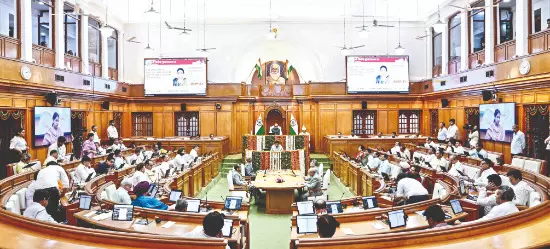Delhi Assembly draws the line on fees

New Delhi: The fifth day of the Delhi Assembly’s Monsoon Session on Friday saw the BJP-led government pass its first-ever legislation to regulate fee hikes by recognised private unaided schools, alongside heated debates on the GST Amendment Bill, a scathing CAG report on labour welfare, and policy measures to curb illegal borewells.
The Delhi School Education Transparency in Fixation and Regulation of Fees Bill, 2025 was cleared after a four-hour discussion. All eight amendments moved by the Aam Aadmi Party (AAP) were rejected. Forty-one BJP MLAs and 17 AAP legislators were present during the vote. Speaker Vijender Gupta said the Bill will be sent to Lt Governor V.K. Saxena for approval.
The Bill, tabled by Education minister Ashish Sood on Monday, extends prior government approval for fee hikes to all private unaided schools, replacing the earlier rule that applied only to about 350 schools on government land. “All private unaided schools in Delhi, irrespective of where they are built, will now need prior permission before raising their fees,” Sood said.
Chief Minister Rekha Gupta called the legislation a message that “education is not a commercial enterprise” and “the first time a government is openly standing alongside the parents of school children in Delhi”. She added, “The AAP is looking sideways now as the BJP government did what it could not do while being in power.”
LoP Atishi criticised it as “a bill in favour of private schools, not parents”, demanding it be sent to a select committee. “Why not put it for public opinion even once in four months? The bill stamped the increased fees of private schools. Why does the 13-page bill not mention audits? The bill also took away the right to go to court,” she charged. AAP’s Saurabh Bharadwaj claimed the bill sought to shield 350 schools from past court scrutiny.
The Delhi Goods and Services Tax (Amendment) Bill, 2025 was passed after sharp exchanges. CM Gupta said the amendments, mirroring central GST reforms, aimed to “simplify tax administration, boost compliance, and provide substantial relief to taxpayers”.
Key measures included extending ITC claim deadlines, lowering appeal pre-deposits from 10 per cent to 7 per cent, setting up a GST Appellate Tribunal, launching an amnesty scheme, and machine-tracking gutkha production. The CM said the amnesty scheme alone had yielded Rs.218 crore.
She rebuked Atishi for “questioning reforms passed in meetings she did not attend”, noting absences from several GST Council sessions.
Atishi countered that the bill “will further harass ordinary traders” by allowing officials to “demand paperwork in any format” and offering tax exemptions to SEZs “belonging to BJP’s industrialist friends”. She alleged it would “crush small traders under new layers of bureaucracy” and impact prices in the real estate and commercial sectors. Chaos ensued, and AAP MLA Anil Jha was marshalled out.
CM Gupta accused the former AAP government of leaving Rs.5,200 crore in the labour welfare fund unused while construction workers awaited aid. Quoting the CAG, she said no benefits were disbursed for tool assistance, permanent disability, or medical aid in multiple years. “What happened to the remaining Rs 6,000 per worker when the approved assistance was Rs 8,000?” she said, citing a Supreme Court rebuke.
AAP’s Virendra Kadian replied that the BJP was cherry-picking from a report covering the COVID-hit period, when workers had been given Rs 5,000 each during the pandemic.
Speaker Vijender Gupta highlighted that Rs 15,327 crore remained unspent in 2023–24, with Rs 8,376.40 crore lapsing, and Rs 3,760.84 crore lacking utilisation certificates. The reports on finances and labour welfare were referred to the PAC for examination.
Water Minister Parvesh Verma announced enforcement teams to curb illegal borewells, with regulation instead of sudden bans. He accused the former government of unplanned work, citing a Rs.7 crore Sangam Vihar pipeline needing an extra Rs.4 crore to fix leaks. He alleged the previous regime sought a “6 per cent commission” from the Asian Development Bank for the Wazirabad water project, causing ADB to pull out. The project, he said, had since been revived.



